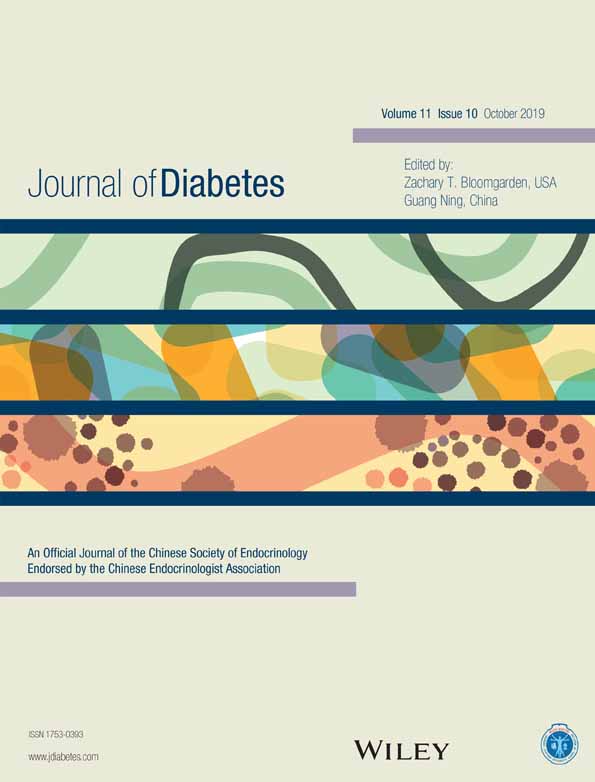Ethnic differences in prevalence, risk factors, and perinatal outcomes of gestational diabetes mellitus: A comparison between immigrant ethnic Chinese women and Australian-born Caucasian women in Australia
妊娠期糖尿病的患病率、危险因素以及围产期结局的种族差异:澳大利亚华裔女性移民与澳大利亚出生的白人女性的比较
Funding information HT and JB were supported by National Health and Medical Research Council fellowships. CSW was supported by a Research Training Program from the Australian Government. The funding bodies had no direct involvement in this study.
Abstract
enBackground
The prevalence of gestational diabetes mellitus (GDM) is increasing worldwide. Ethnic differences in risk factors and perinatal outcomes are clinically important. Chinese women constitute approximately 10% of the world's population, and are an increasing migrant population, yet prevalence, risk factors, and outcomes of GDM in this population are insufficiently explored.
Methods
A retrospective study of a large pregnancy dataset comparing GDM prevalence, risk factors, and perinatal outcomes between immigrant ethnic Chinese women and Australian-born Caucasian women was conducted using logistic regression.
Results
Overall, 73 517 births were extracted from the pregnancy databases of two of Australia's largest maternity services. Chinese women (n = 3419) had a 4-fold higher risk of GDM than Caucasians (n = 28 594) after adjusting for risk factors of GDM. A past history of GDM (adjusted odds ratio [aOR] 5.24; 95% confidence interval [95% CI] 2.91-9.42] was the main GDM risk factor in both groups. Other GDM risk factors varied between groups. Perinatal outcomes in Chinese women with and without GDM were similar, except for neonatal hypoglycemia (aOR 2.01; 95% CI 1.14-3.56]. Caucasian women with GDM had more adverse perinatal outcomes than women without GDM. After adjusting for confounders, Chinese women with GDM had a lower risk of labor induction, large-for-gestational-age babies, neonatal hypoglycemia, respiratory distress, and low Apgar scores than Caucasian women with GDM.
Conclusions
Differences in prevalence, risk profile, and adverse outcomes in GDM were evident between ethnic Chinese and Caucasian women. A precision medicine approach to GDM may be warranted considering ethnicity and individual risk profiles rather than a one-size-fits-all approach.
Abstract
zh摘要
背景
妊娠期糖尿病(gestational diabetes mellitus,GDM)的患病率在全球范围内不断上升。GDM危险因素以及围产期结局的种族差异具有重要的临床意义。中国女性约占世界人口的10%,并且其中移民人口越来越多,然而,目前尚未对这一人群中的GDM患病率、危险因素以及结局进行过充分的研究。
方法
这是一项利用大型妊娠数据集的回顾性研究,采用逻辑回归方法比较了华裔女性移民与澳大利亚出生的白人女性的GDM患病率、危险因素以及围产期结局的差异。
结果
从澳大利亚两个最大的产科服务机构的妊娠数据库中共提取了73 517名新生儿的相关数据。校正GDM的危险因素后,华裔女性(n=3419)患GDM的风险比白人女性(n=28 594)高4倍。在两组人群中既往GDM病史均为GDM的主要危险因素(校正后的比值比[aOR] 5.24;95%可信区间[95% CI] 2.91-9.42)。两组之间的其他GDM危险因素存在差异。除新生儿低血糖外(aOR 2.01;95% CI 1.14-3.56),合并或者未合并GDM的华裔女性围产期结局相似。与未合并GDM的白人女性相比,合并GDM的白人女性的不良围产期结局更多。校正混杂因素后,与合并GDM的白人女性相比,合并GDM的华裔女性中引产、分娩大于胎龄儿、新生儿低血糖、呼吸窘迫和低Apgar评分的风险均较低。
结论
华裔女性与白人女性的GDM患病率、危险因素特征以及不良结局均存在明显差异。考虑到种族与个体危险特征均存在差异,对GDM患者需要采用精准的治疗方法,而不是一刀切的方法。




